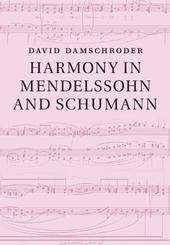
|
Harmony in Mendelssohn and Schumann
Paperback / softback
Main Details
| Title |
Harmony in Mendelssohn and Schumann
|
| Authors and Contributors |
By (author) David Damschroder
|
| Physical Properties |
| Format:Paperback / softback | | Pages:292 | | Dimensions(mm): Height 245,Width 172 |
|
| Category/Genre | Theory of music and musicology
Romantic music (c 1830 to c 1900)
Bands, groups and musicians |
|---|
| ISBN/Barcode |
9781108406246
|
| Classifications | Dewey:781.25 |
|---|
| Audience | | Professional & Vocational | |
|---|
| Illustrations |
Worked examples or Exercises; 102 Printed music items; Worked examples or Exercises; 102 Printed music items
|
|
Publishing Details |
| Publisher |
Cambridge University Press
|
| Imprint |
Cambridge University Press
|
| Publication Date |
19 September 2019 |
| Publication Country |
United Kingdom
|
Description
This innovative book continues David Damschroder's radical reformulation of harmonic theory, presenting a dynamic exploration of harmony in the compositions of Mendelssohn and Schumann, two key figures of nineteenth-century classical music. This volume's introductory chapters creatively introduce the basic tenets of the system, with reference to sound files rather than notated music examples permitting a more direct interaction between reader and music. In the Masterworks section that follows, Damschroder presents detailed analyses of movements from piano, vocal, and chamber music, and compares his outcomes with those of other analysts, including Benedict Taylor, L. Poundie Burstein, and Peter H. Smith. Expanding upon analytical practices from the eighteenth and nineteenth centuries, and strongly influenced by Schenkerian principles, this fresh perspective offers a stark contrast to conventional harmonic analysis - both in terms of how Roman numerals are deployed and how musical processes are described in words.
Author Biography
David Damschroder is Professor of Music Theory at the University of Minnesota. His research focuses on harmony in tonal music, a project that began with a careful examination of historical analytical practices, the basis for his Thinking about Harmony: Historical Perspectives on Analysis (Cambridge, 2008). He has since published studies on harmony in selected composers including Haydn, Mozart, Beethoven, Schubert, and Chopin, and he is the author of Tonal Analysis: A Schenkerian Perspective (2017).
|